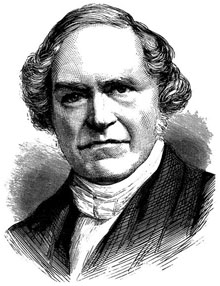
Whewell
William Whewell (24 May 1794 – 6 March 1866) was a polymath who worked in mechanics, geology, astronomy, and economics, but his greatest influence was as a philosopher and historian of science. He was also a wordsmith: the word ‘scientist’ is due to him, coined in a review of Mary Somerville’s On the Connexion of the Sciences. His Philosophy of the Inductive Sciences, Founded Upon Their History of 1840 is the first treatise to be recognizably a work in the history and philosophy of science. In it he attempted to develop a theory of induction. Using a phrase that was later to be central to logical empiricists like Rudolf Carnap, this theory was based on ‘the explication of conceptions’. However, following Francis Bacon, there was a parallel process of ‘colligation of facts’, with which concepts once explicated were to be united.
He was born in Lancaster, and educated at Haversham grammar school. He won a scholarship to Trinity College, Cambridge, where in 1816 he was Second Wranger. He became a Fellow of Trinity College in 1817 and, in 1841, Master.
Links
Stanford Encyclopedia of Philosophy >
